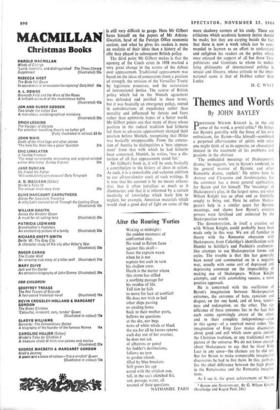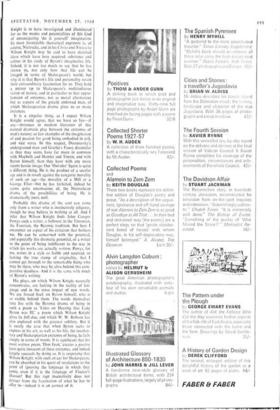Themes and Words
By JOHN BAYLEY
pROFESSOR WILSON KNIGHT is, in the old sense of the word, a genial critic.* He brings out Byron's geniality with the force of his own
enthusiasm, for Byron—like himself—combined a perpetual effervescence of spirits with what one might think of as its opposite, an obsessional interest in the treatment of his problems and passions in the abstract.
'The embedded meanings of Shakespeare's drama,' he suggests, 'are in Byron's rendered, in the general manner of Byronic and other
Romantic drama, explicit.' He refers here to Antony and Cleopatra and Sardanapalus, but
the comment has a more general application, for Byron and for himself. The 'meanings' of Shakespeare's play, in the largest sense, are what Wilson Knight has so often and so fruitfully sought to bring out. Here he enlists Shakes- peare's help in a similar quest for Byronic meanings, and shows how Byron's creative powers were fertilised and animated by the Shakespearian world.
The demonstration, in itself a creative act with Wilson Knight, could probably have been made only in this way. We are all familiar in theory with the Romantic obsession with Shakespeare, from Coleridge's identification with Hamlet to Schiller's and Pushkin's craftsman- like attempts to use Shakespearian forms and styles. The trouble is that this has generally been noted and commented on in a negative way, usually with some sort of depressed and depressing comment on the impossibility of making use of Shakespeare. Wilson Knight attempts, and with astonishing success, a more positive approach.
He is concerned with the oscillation of Byron's imagination between Shakespearian extremes, the extremes of hate, cynicism and
disgust, on the one hand, and of love, tender- ness and redemption, on the other. The sig-
nificance of these extremes lies in the fact that each seems agonisingly aware of the other, and in their complete independence—even
in this agony—of a received moral order. The imagination of King Lear makes discoveries about good and evil which seem quite outside the Christian tradition, or any traditional moral picture of the universe. We do not know enough about Shakespeare to say that he lived King Lear in any sense—the chances are he did not. But for Byron to make comparable imaginati‘e discoveries he had to live them. In this, perhaps, lies the chief difference between the high places in the Renaissance and the Romantic imagina- tions.
As I see it, the great achievement of Wilson
* BYRON AND SHAM-SPE-ARE. By G. Wilson Knight (Routledge and Kegan Paul, 24s.)
Knight is to have investigated and illuminated for us the modes and potentialities of this kind of emancipating 'do it yourself' imagination.
Its most formidable theoretical exponent is, of course, Nietzsche, and in his Christ and Nietzsche
Wilson Knight may be said to have sketched ideas which have here acquired substance and colour in his study of Byron's imaginative life. Indeed, it is not too much to say that he has shown us, not only how that life can be imaged in terms of Shakespeare's world, but why it is that Byron's life and personality retain their extraordinary fascination for us. They hold a mirror up to Shakespeare's multitudinous vision of nature, and in particular to that appre- hension of extremes, not as moral alternatives but as aspects of the greatly endowed man, of which Shakespearian drama gives us so many instances.
It is a singular thing, as I expect Wilson Knight would agree, that we have so few—if any—instances in modern literature of this natural dramatic play between the extremes of man's nature; so few examples of the imagination of and passion for good being embodied in evil, and vice versa. In this respect, Dostoievsky's underground man and Goethe's Faust, dissimilar as they may seem, have far more in common with Macbeth and Hamlet and Timon, and with Byron himself, than they have with any more recent heroic image. Our 'Outsider' figure is quite a different thing. He is the product of a secular age and is in revolt against the categoric morality of such an age—the morality of a Mill or a George Eliot—but he has forfeited, indeed he seems quite unconscious of, the Nietzschean drama of the possibilities of being. He is dramatically inert, null.
Probably this drama of the soul can come only from a writer who is instinctively religious, though he may believe in nothing at all. And I infer that Wilson Knight finds John Cowper Powys such a writer, a follower in the Timonian, the Faustian, the Byronic tradition. But here I encounter an aspect of his criticism that bothers me. He can be concerned with the potential, and especially this dramatic potential, of a writer
to the point of being indifferent to the way in which his works are actually written. Powys, for
me, writes in a style so feeble and received, so lacking the true stamp of originality, that I cannot get through to the remarkable being who may be there, who may be alive behind this com- parative deadness. And it is the same with much of Byron's writing.
His plays, on which Wilson Knight naturally concentrates, are lacking in the reality of lan- guage and in the tense impact of new words.
We are forced back on Byron himself, who is so visible behind them. The words themselves take fire with the Byronic drama of being in such a poem as `Lines on Hearing that Lady Byron was Ill,' a poem which Wilson Knight gives its full due, and which W. W. Robson has also explored with the greatest subtlety. But it is surely the case that when Byron seeks to express in his art, as well as his life, the involun- tary and Shakespearian extremes of being, he fails simply in terms of words. It is significant that his
most written poem, 'Don Juan,' creates a passive
hero quite innocent of these extremes, and indeed largely succeeds by doing so. It is surprising that
Wilson Knight, with such an ear for Shakespeare, can be absorbed in his quest of revelations to the point of ignoring the language in which they come, even if it is the language of Flecker's Hassan! But this rapt insensitivity does not detract from the fascination of what he has to offer us—indeed it is an earnest of it.















































 Previous page
Previous page